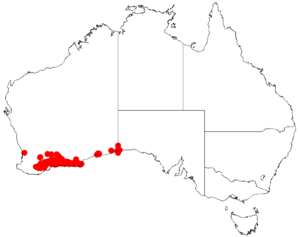Acacia mutabilis facts for kids
Acacia mutabilis is a type of shrub, also known as a wattle, that belongs to the Acacia family. It is special because it only grows in the southwestern part of Australia. This means it's an endemic plant, found nowhere else in the world!
Quick facts for kids Acacia mutabilis |
|
|---|---|
| Scientific classification | |
| Genus: |
Acacia
|
| Species: |
mutabilis
|
 |
|
| Occurrence data from AVH | |
Description
This shrub usually grows to be about 0.3 to 3 metres (1 to 10 ft) tall. Its branches are smooth and don't have hairs. It has small, green leaf-like structures called phyllodes. These phyllodes are usually straight or slightly curved. They can be 1.5 to 5.5 cm (0.59 to 2.17 in) long and 1 to 8 mm (0.039 to 0.315 in) wide.
Acacia mutabilis blooms with bright yellow flowers from August to October. The flowers grow in small, round clusters, each about 4 to 5 mm (0.16 to 0.20 in) across. Each cluster can have between 16 and 32 golden flowers.
After the flowers, the plant forms seed pods. These pods are black and can be curved or even coiled like a spring. They can grow up to 7 cm (2.8 in) long and are about 2 to 3 mm (0.079 to 0.118 in) wide. Inside these pods are shiny black seeds, which are about 3 to 4 mm (0.12 to 0.16 in) long.
Taxonomy
A botanist named Bruce Maslin first officially described this plant in 1999. He wrote about it in a scientific journal called Nuytsia. For a short time in 2003, another botanist, Leslie Pedley, reclassified it. But by 2006, it was moved back into the Acacia group.
There are five different types, or subspecies, of Acacia mutabilis:
- Acacia mutabilis subsp. angustifolia
- Acacia mutabilis subsp. incurva
- Acacia mutabilis subsp. mutabilis
- Acacia mutabilis subsp. rhynchophylla
- Acacia mutabilis subsp. stipulifera
Acacia mutabilis is closely related to other wattles. These include Acacia halliana, Acacia merrallii, Acacia simmonsiana, and Acacia nitidula.
Distribution
This plant grows naturally in the Great Southern and Goldfields-Esperance areas of Western Australia. You can find it from around Gnowangerup in the west, all the way to the border of South Australia in the east.
It likes to grow in different places. These include sand dunes, rolling plains, low areas, and near salt lakes. It can grow in sandy, clay, gravelly, or loamy soils.

